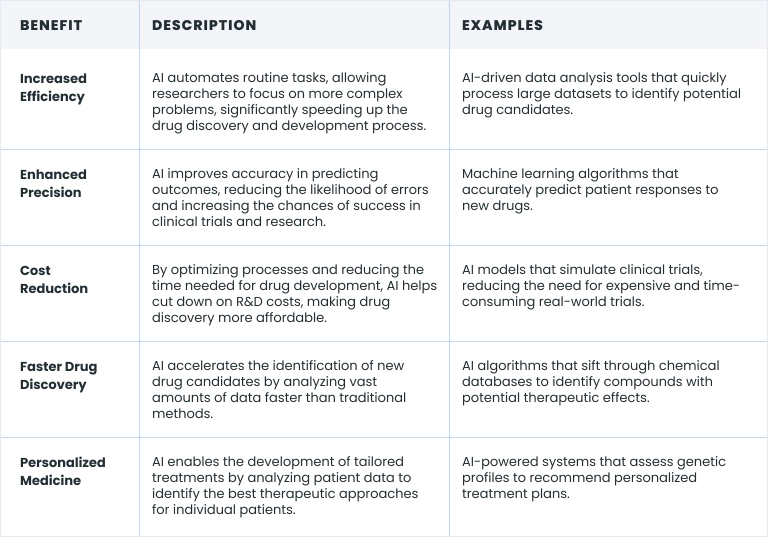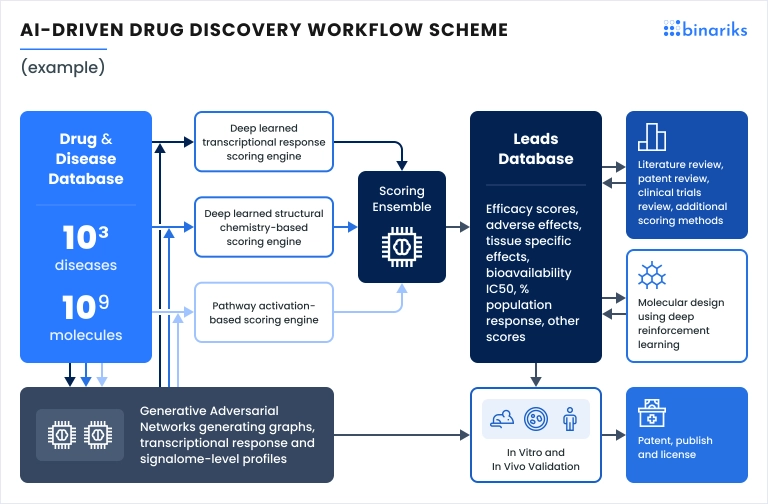The pharmaceutical industry is undergoing a significant transformation, driven by the integration of AI in pharma R&D. This shift is not just a technological upgrade but a fundamental change in how research and development are approached.
With the increasing complexity of drug discovery and the demand for more efficient processes, AI and advanced analytics have emerged as essential tools in the pharmaceutical sector.
There are a bunch of benefits of AI in healthcare : it is super helpful in optimizing various stages of drug development, from early-stage research to clinical trials and beyond. By using machine learning algorithms, predictive analytics , and other AI-driven technologies, pharmaceutical companies can now accelerate the drug discovery process, reduce costs, and increase the success rates of new treatments.
This integration of AI enhances efficiency and enables the discovery of new therapeutic possibilities that were previously out of reach.
In this article, you will learn about:
- The critical role of AI in the pharma industry
- Various types of AI technologies used in pharma R&D
- Practical applications of AI in research and development of different medicines
- The latest innovations and prospects of AI in the pharmaceutical industry
Read on to explore how exactly Pharma R&D is about to get wild because it absolutely is.
The role of AI in pharmaceutical R&D
As the industry embraces digital transformation, pharma AI is becoming a game-changer in research and development. Below is a detailed overview of how AI drives significant benefits across various stages of pharma R&D, from boosting efficiency to enhancing precision and cutting costs.

Types of AI technologies in pharma R&D
Various advanced technologies support the integration of artificial intelligence in pharma R&D, each playing a crucial role in enhancing different aspects of drug discovery and development. Below is a detailed look at the key AI technologies involved and their specific responsibilities within pharmaceutical R&D.
Machine Learning (ML)
- Role in pharma R&D: Machine learning is at the core of AI applications in pharma, enabling systems to learn from data and make predictions. In drug discovery, ML models analyze vast datasets to identify potential drug candidates, predict their efficacy, and optimize chemical structures.
- Key contribution: ML accelerates the drug development process by rapidly processing and analyzing data that would take humans much longer to interpret.
Natural Language Processing (NLP)
- Role in pharma R&D: NLP allows AI systems to understand and interpret human language. In pharmaceutical R&D, NLP is used to analyze scientific literature, patents, clinical trial data, and other text-based sources to extract valuable insights, identify trends, and stay updated with the latest research.
- Key contribution: NLP streamlines the research process, helping researchers efficiently access and digest vast amounts of textual data.
Deep learning
- Role in pharma R&D: A subset of ML, deep learning involves neural networks with multiple layers that can model complex patterns in data. In pharma R&D, deep learning is used for tasks such as image analysis in medical imaging, predicting molecular behavior, and simulating drug interactions.
- Key contribution: Deep learning enhances the precision of predictions and simulations, which is critical for identifying viable drug candidates and understanding their interactions within the human body.
Robotics
- Role in pharma R&D: When integrated with AI, robotics automates physical tasks within laboratories, such as high-throughput screening, compound synthesis, and repetitive testing procedures. AI-powered robots can work around the clock, significantly speeding up experimentation.
- Key contribution: Robotics increases the efficiency and throughput of experimental procedures, allowing for faster and more accurate results in drug testing.
Predictive analytics
- Role in pharma R&D: Predictive analytics involves using statistical algorithms and ML techniques to forecast outcomes based on historical data. In pharmaceutical R&D, it is used to predict patient responses to drugs, potential side effects, and clinical trial success rates.
- Key contribution: Predictive analytics helps make informed decisions, reducing the risks and costs associated with drug development.
These technologies collectively empower AI for the pharmaceutical industry by streamlining research, improving accuracy, and ultimately leading to more effective and faster drug development.
Applications of AI in pharma R&D
Integrating artificial intelligence in pharma is leading to groundbreaking advancements in research and development. Below are some prominent examples:
AI-driven drug discovery
Pharmaceutical AI is greatly improving the drug discovery process by analyzing massive datasets to identify potential drug candidates. Machine learning models can predict how different compounds interact with biological targets, significantly reducing the time and cost associated with traditional drug discovery methods.
For example, AI algorithms can screen millions of compounds in silico to narrow down the most promising candidates, which can then be further tested in the lab.

Accelerating clinical trials
Clinical trials are a critical phase in drug development but are often time-consuming and expensive. AI can improve this process by optimizing patient recruitment, predicting outcomes, and identifying potential issues early on.
For instance, AI can analyze patient data to match individuals with the proper clinical trials based on their genetic profiles, medical history, and other factors. This not only speeds up the trial process but also increases the chances of success.
Enhancing predictive modeling
Predictive modeling is another area that is making a significant impact. AI algorithms can analyze historical data from previous trials and research to predict the efficacy and safety of new drugs.
This allows researchers to make more informed decisions about which drug candidates to pursue, potentially saving millions in development costs and reducing the risk of failure in later stages.
Personalizing treatment plans
Personalized medicine is becoming increasingly important in the pharmaceutical industry, and AI is at the forefront of this movement.
By analyzing a patient's genetic data, lifestyle, and other factors, AI can help develop more effective personalized treatment plans with fewer side effects. This is particularly valuable in the treatment of complex diseases like cancer, where a one-size-fits-all approach typically falls short.
Optimizing manufacturing processes
AI is also being used to optimize pharmaceutical product manufacturing processes. By analyzing data from production lines, AI can identify inefficiencies, predict equipment failures, and suggest adjustments to improve quality and reduce waste.
This ensures that drugs are produced more reliably and at a lower cost, ultimately benefiting both the manufacturer and the end consumer.
Enhancing drug repurposing
Drug repurposing—finding new uses for existing drugs—has gained traction as a cost-effective way to develop new therapies.
AI can sift through vast amounts of data from past research and clinical trials to identify potential new applications for known drugs. This accelerates the development timeline and can lead to breakthroughs in treating diseases that previously had limited treatment options.
These examples illustrate how AI can improve pharma R&D, making it more efficient, cost-effective, and capable of delivering personalized and innovative solutions to complex health challenges. This progress instills confidence in the industry's ability to meet future challenges.
Latest innovations & prospects
The future of AI-driven R&D in biopharma is full of promising trends, each highlighting the great potential of AI in this industry:
- Predictive and precision medicine: AI will enhance the prediction of disease outbreaks and patient responses, driving the widespread adoption of precision medicine.
- AI-powered drug design: AI will increasingly be used to design entirely new drugs, enabling faster drug discovery and opening new treatment possibilities.
- Integration with genomics: AI will play a crucial role in biomarker discovery, leading to more accurate diagnoses and highly personalized therapies.
- Optimized clinical trials: AI will further streamline clinical trials through virtual simulations and faster patient recruitment, reducing time and costs.
- Regulatory affairs: AI will automate compliance checks and streamline the regulatory approval process, speeding up the time to market for new drugs.
- AI-driven companies: Investment in AI will be essential for biopharma companies to stay competitive and lead in innovation.
According to Pharmaceutical Technology, AI has been voted as the most disruptive emerging technology every year since 2020 (Source ).
All these trends indicate that AI in biopharma research is an area with vast potential, making it a smart investment for the future.
AI for pharma R&D with Binariks
At Binariks, we specialize in helping businesses harness the power of the latest tech, including AI in pharma, to transform their research and development processes. Our team of experts delivers tailored AI solutions that can address key challenges in drug discovery, clinical trials, and data analysis, ensuring faster innovation and more effective results.
We focus on creating solutions that integrate seamlessly into existing workflows, enhancing data management, and ensuring regulatory compliance. By partnering with Binariks, you can streamline your R&D efforts, accelerate time to market, and stay competitive in the world of AI and pharma.
Ready to elevate your pharma R&D with AI? Let’s work together to make it happen!
Share

